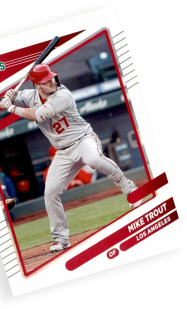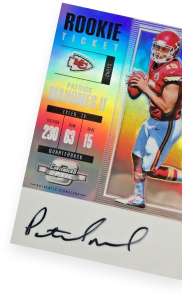COMMENTARY: MLB Properties vs. Upper Deck — Why just Topps?

With the MLB Properties case against Upper Deck set for an April 19 court date, Beckett Media will be examining several aspects of the complicated and wide-scoped case through a series of commentary pieces. We’ll examine MLBP’s complaint, Upper Deck’s argument, try to address some key questions and more …
By CHRIS OLDS | Beckett Baseball Editor | COMMENTARY
Part 1 … Why just Topps?
Details of licensing agreements — or details of non-renewals — are rarely disclosed in the industry as leagues prefer to keep their financial agreements and contractual timeframes confidential.
But when MLB Properties announced on Aug. 5, 2009, that it had signed an exclusive licensing agreement with Topps, that left some people wondering … why just Topps?
After all, Upper Deck had announced just a month earlier that it had a deal with the MLB Players Association. And, just two days after MLB Properties announced its deal, Upper Deck responded that it remained “100 percent committed to building the highest quality and most innovative baseball cards in the industry,” which set the stage for where we are today.
Where is that? On April 19, MLB Properties squares off with Upper Deck in court over alleged “trademark infringement, trade dress infringement, trademark dilution, trade dress dilution, breach of contract and unfair competition” with its recent release of three baseball card sets.
But what might have gone into the decision to not renew Upper Deck’s deal? A handful of details have been noted in court documents and others have been disclosed to Beckett Media by MLB Properties, while Upper Deck declined to comment on that decision or the case.
A Changing Landscape
In its lawsuit, MLB Properties notes that over the last decade the revenue from baseball card licensing has totaled more than $75 million, despite the overall business for the four major sports — baseball, football basketball and hockey — falling from a billion-dollar industry in its prime to roughly $200 million today.
MLB Properties also notes that baseball’s share in that market has fallen as well from a definite majority to holding roughly 15 to 20 percent of the market — not a tough one to understand as the number of non-baseball products and manufacturers has dramatically increased in those years.
With these numbers in hand, MLB Properties opted to go with an exclusive licensee — a move that has been done in other sports as Panini is the exclusive manufacturer of NBA cards and Upper Deck is the exclusive licensee of NHL cards.
“In MLBP’s reasoned judgment, having an excessive number of trading card licensees diminishes and dilutes the value of the trading card business,” reads the complaint. “MLBP has, therefore, made the strategic business decision to reduce the number of companies that are authorized and licensed. …
“Specifically, MLBP has decided that it is currently most beneficial to enter into an exclusive multi-year licensing deal with just one trading card manufacturer and distributor, The Topps Company.”
Ok, so that covers one aspect of the decision — MLB Properties reacted to a shrinking market and decided the best course of action for its business, which is to be the licensing agent working in the best interests of all 30 clubs. It’s not an unreasonable move considering that just a few years ago the roster of MLB card licensees included Topps, Upper Deck, Donruss/Playoff and Fleer, two of which no longer exist today.
Other reasons?
But is reacting to the market a lone barometer for a licensing decision by MLBP? Financial obligations always come into play on decisions like these, but if they were an issue in this case, they haven’t been disclosed publicly. Instead, they have only been noted as part of the court filings.
Upper Deck owes MLB Properties more than $2.4 million due under its previous licensing agreement and also is in default for “failure to perform multiple terms and conditions prior to the expiration of the agreements.” The money owed falls under five areas — for domestic trading cards, international trading cards, Hall of Fame trading cards, the Hall of Fame authentication program and the MLB authentication program.
What exactly the other obligations are remains unknown as they were not disclosed in the filing, however a reference is made in the declaration of MLB Properties Senior Vice President of Licensing Howard Smith to a cease and desist letter from MLBP to Upper Deck that noted its past obligations “to fulfill numerous affirmative obligations, including with respect to quality control and royalty reporting.”
According to the filing, Upper Deck responded to the letter the following day, denying the allegations and refusing to halt sales of the products.
MLBP also prominently noted in its filing Upper Deck’s recent multi-million dollar settlement with Konami, where Upper Deck was found to have created more than 600,000 unauthorized (counterfeit) Yu-Gi-Oh! trading cards without Konami’s permission. MLBP cited that as indicative of a “flagrant disregard of the intellectual property rights of its licensors,” a move that caused “substantial harm to its own licensor.”
Konami had sought in its long-running case with Upper Deck “hundreds of millions” of dollars in damages. The settlement was confidential, but was to be paid in two installments — one of which is still to be made. (If it is not made by July 26, Upper Deck will be back in court.)
In its response to MLBP seeking a temporary restraining order (which was ultimately denied in favor of the April 19 court date), Upper Deck claimed that a TRO “would be devastating to Upper Deck and its business partners; so much so that the company may never fully recover from such an order.” Later in the court documents, the company claimed it would sustain “economic losses in the millions” if even a 10-day TRO had been granted.
Furthermore, Upper Deck’s Director of Sports Brands, Jason Masherah, stated in his court-filed declaration that Upper Deck’s Series 1 baseball set accounts for “about 10-20 percent of Upper Deck’s baseball trading card revenue in a given year” and that the three products that prompted the MLB complaint — 2009 Signature Stars, 2009 Ultimate Collection and 2010 Upper Deck Series 1 — will generate revenue totaling $10 million.
Upper Deck had sought a bifurcated trial — one part for liability, one for damages — which was denied. MLBP argued that delaying the damages phase would increase “the likelihood that Upper Deck would seek bankruptcy protection or go out of business altogether during the interim period between trials” and that such a move could damage MLBP’s likelihood of recovering any potential damages. Upper Deck argued that preparing for the damages portion would be unnecessary if it wasn’t found liable.
So, it’s easy to see that the products in question are important to the company in terms of revenue from trading cards — and even a substantial chunk of revenue for the year based on Masherah’s statement. Consider that total, while it isn’t the company’s lone source of revenue, and then consider that Upper Deck apparently owes MLBP money, just had a presumably large settlement with Konami and (presumably) has been paying off a $97 million debt with the IRS and the California tax board within the last year.
MLB Properties on its licensing decision
In a statement to Beckett Media seeking details on why it opted for Topps over Upper Deck in its licensing decision, MLB Properties Vice President of Business Public Relations Matt Bourne did not address Upper Deck directly. Instead, he cited the shrinking marketplace and aspects that MLBP decided were in Topps’ favor.
“We’ve entered into exclusive deals in almost every other area of our licensing business in recent years,” Bourne said. “As a result, business has grown in each case and the fans benefit from increased investment into product development.
“When we determined we wanted to go this route in the trading card business, we chose Topps for the following reasons:
“Topps demonstrated a superior product as well as superior distribution and marketing.
“Topps has been a long-time partner of MLB. We signed our first agreement 40 years ago.
“Topps has been at the forefront of creating interesting new products appealing to kids: Topps Attax, 3D Live [and] Topps Town.”
Bourne also cited Topps Attax as the No. 1 selling licensed item for several MLB teams during a particular timeframe last year as well as the card game’s strong sales in one particular sporting goods chain — obviously supporting MLB Properties’ push toward focusing the industry on younger collectors.
We’ll have more on the case in the coming days, examining MLBP’s complaint, Upper Deck’s argument and more here and in upcoming issues of Beckett Sports Card Monthly and in Beckett Baseball.
Chris Olds is the editor of Beckett Baseball and Beckett Graded Card Investor. Have a comment, question or idea? Send an e-mail to him at colds@beckett.com.




Great article! Thanks for breaking down the key points and distilling it for collectors to read and consider. I personally think Upper Deck’s days are numbered given all the judgements against them, tax evasion, and outright fraud.
[…] Beckett Magazine, a popular collector’s publication, has been closely following the case on their blog. Beckett has also published some of my commentary on the case, and I’ll likely be working […]